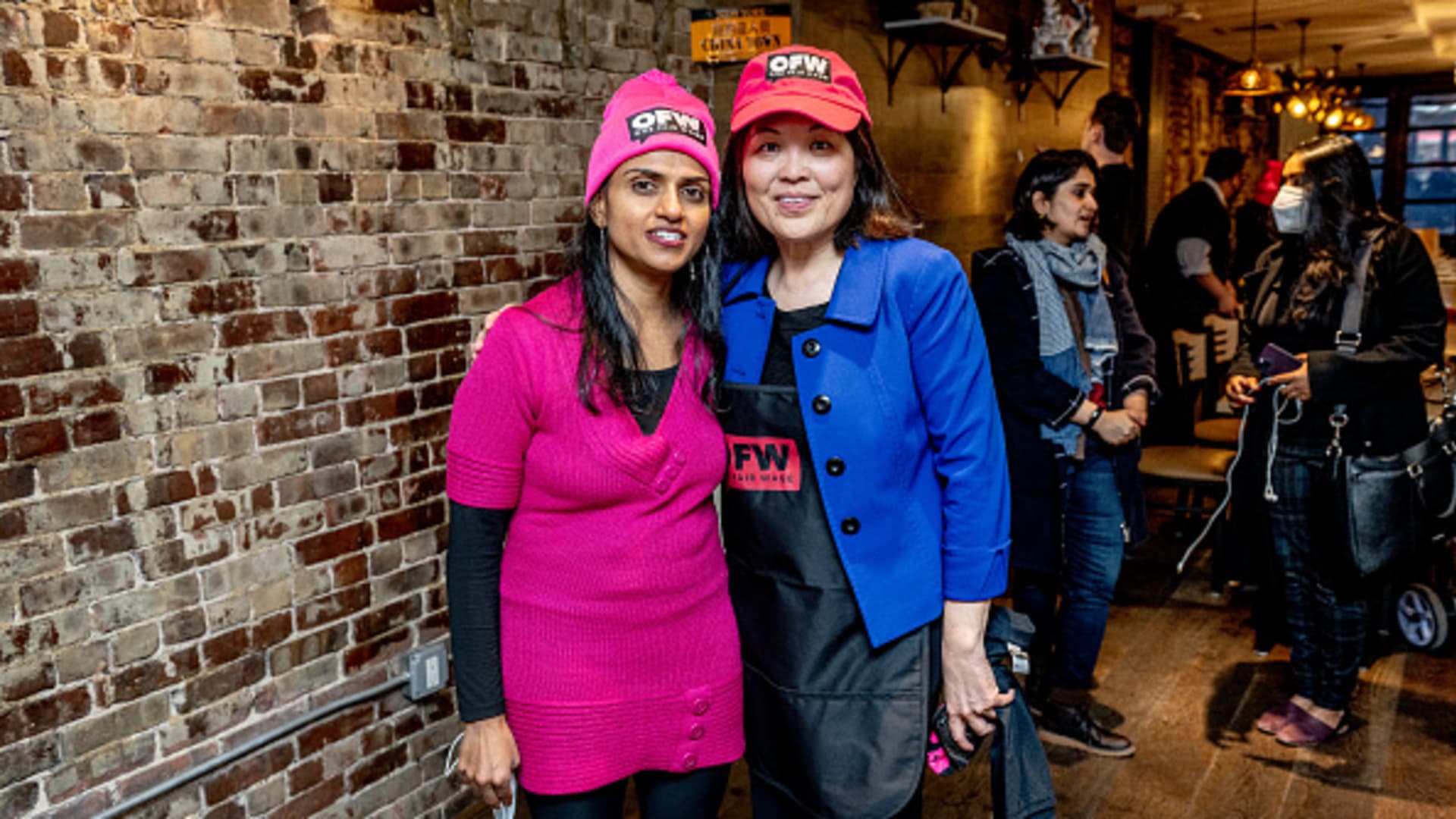
- Chicago, the nation's third-biggest city and a foodie capital, is set to eliminate the subminimum wage for tipped employees like servers and bartenders, with uncertain consequences for not just workers but diners and restaurants.
- Advocates say it will end exploitation of women and Blacks; opponents say it will slash worker pay and restaurant profits.
- Social justice advocates are pressing for legislation and ballot initiatives across U.S. states.
Until now, Michael Hornick hasn't been a very typical restaurant owner. His 40-year old Chicago Diner is vegetarian, in a diner niche that exalts burgers and fries. He pays 75% of his staff's health insurance premiums and a retirement-savings match. And after Covid, in a move that remains unproven but may become more common as a model within the restaurant industry, he began adding a 20% service charge to bills to revamp the way he pays his servers and other front-of-house staff.
Early next month, Chicago's City Council will move to make America's third-largest city the latest jurisdiction to abolish the subminimum wage for tipped employees, requiring restaurants to meet the regular $15.80 minimum for bartenders, servers and more, up from $9.48 plus tips now. After a months-long public campaign that began shortly after Mayor Brandon Johnson took office in May, advocates reached a deal with industry lobbyists to phase out the tipped-minimum wage over five years.
With more than half of the 50-member City Council co-sponsoring the bill, it had always been nearly certain to pass in some form, changing the business model for an industry that includes an estimated 7,300 restaurants in the city, and 750,000 nationwide, employing 12.3 million workers. The Council is expected to pass the law on Oct. 4. And the issue may be coming to an eatery near you next.
"The closest pending victory is in Chicago," said Saru Jayaraman, founder and president of the advocacy group One Fair Wage. "But multiple states are going to move in their legislatures, and it will be on the ballot in four states next November (of 2024)."
Advocates say the new law will assure a living wage to working-class staffers, and address a legacy of racism, sexism, and even "looksism," the widely held (and statistically supported) view that prettier waitresses get bigger tips. Opponents, led by the Illinois Restaurant Association, argued that the proposal will cut restaurant profits in half and cut the effective income of tipped workers it says now earn a median of $28.48 an hour in Chicago – and who, in other states and cities, usually make well more than the minimum wage.
The push to make this happen through legislation and referenda follows the failure of a long push to accomplish the same goals privately. New York restaurateur Danny Meyer was the most high-profile of hundreds of bistro owners who eliminated tipping in 2015, but the dining publication Eater reported in 2020 that nearly all of them had abandoned the experiment by 2018 and Meyer himself relented in 2020 during Covid. The culprits: Diners objected to the higher prices that his "hospitality included" menu required, and an estimated 30% to 40% of servers quit, often going to competing restaurants that kept tips.
Money Report
"I see and feel both sides," said Hornick, president of Chicago Diner, which has two locations he owns with partners. Overall, he is in favor of the coming law. "In the end, we are talking about people who support me and support my business," he said.
The bill, and the broader conversation about whether tipping is in the best interest of workers or restaurants, is the talk of the industry here, even getting a nod in an episode of "The Bear," Hulu's dramedy about a Chicago restaurant.
Feeling out of the loop? We'll catch you up on the Chicago news you need to know. Sign up for the weekly Chicago Catch-Up newsletter here.
Restaurant owners and their representatives have argued that the proposal will break the business model of an industry ravaged by Covid, from which it has only unevenly recovered. Accommodation and food services shed 48,274 Chicago jobs in the year after Covid hit, according to state data, 33,528 of which were recovered by March 2022. Including the suburbs, the U.S. Department of Labor says the industry has all but fully recovered its job this year.
"Fifty/50 is a shell of [what] it used to be, and my biggest cost is labor," said Scott Weiner, co-owner of the Fifty/50 Group, whose flagship restaurant is a gastropub in the gentrified Wicker Park section northwest of downtown. "I can't afford any more. … Even our food delivery guys make $30 an hour. Our full-time servers make high $20s to low $30s on the low end."
A survey of restaurant owners by the restaurant association predicts that profit will fall to just 1.6% of sales under the proposal – thin even for an industry known for frequent business failures and skinny margins. Three-fourths said they would reduce the number of tipped workers on their payroll, and nearly half said the cuts would be significant. And 92% said menu prices will have to rise.
One of them is T.J. Callahan, owner of farm-to-table spot Farm Bar. The 65-seat eatery is in the city's upscale Lakeview neighborhood, a mostly residential area out-of-towners know as the location of Wrigley Field. Farm Bar did just more than $2.1 million in sales last year, he said. He agreed to share an analysis of how his own spot may fare, based on two weeks this summer, in which 11 tipped employees worked 567 hours.
The $9.48 an hour wage most workers got cost the restaurant $5,449.61, he said, a fraction of the $17,198 in tips workers earned. "It works out to $39.80 an hour," he said. Paid $15.80 an hour, as the bill requires, the same workers would have received $8,970, he said. That's a 64% jump in Farm Bar's labor costs for tipped workers, he said, who he said would make less under the new system. Even if he added a 20% service charge to checks, he argued, the fee would likely cut into tips atop the service charge and drive some customers away. That was his own experience in a failed experiment with the new model at a spot he and his partner own in suburban Evanston, he said.
"It takes the restaurant from a small profit to a significant loss," said Callahan, who along with a partner also receives a management fee of 5% of sales.
A good-sized restaurant with 20 tipped employees will have to bring in as much as another $1,000 a day to cover the extra wages, Weiner said. It's a lot for a post-Covid spot, and a bill he said will hit poorer parts of the city hard.
The war against the new wage law
Advocates of eliminating the subminimum wage law point to what they say are scores of top Chicago restaurants that are making a system like what they envision, with service charges and sustained tipping work under current law. The most prominent of those are led by Rick Rick Bayless, the chef and sometimes TV personality behind Frontera Grill and Michelin-star winner Topolobampo in the city's River North section.
When his restaurants reopened after Covid, Bayless instituted a 20% service charge at Bar Sotana and at his flagship Frontera, with a 15% charge at his street-food oriented Xoco next door, and tried to de-emphasize tipping without prohibiting it, he said. The goal was to give workers more stable, predictable pay, even if some servers would earn less, and to improve the culture in restaurants where higher-earning servers could make much more than have chilly relationships with low-salaried kitchen workers, he said. A bonus: Front of house staff don't lose income when business is slow because it's raining, he said.
"We're not making their salary dependent on your generosity as a customer, we're trying to move the restaurant world into a more respectable profession," said Bayless, whose hybrid system of using service charges and encouraging tips of what Frontera's menu calls "a little more" for exceptional service produces total pay from $28 to $36 an hour for roughly 20 front-of-house staff each night.
Before, top servers could crack $100,000 a year at his places while kitchen staffers might get by on $40,000, Bayless said. He's not too worried about predictions that losing tips might cause top servers at expensive places like his – Topolobampo's current tasting menu runs $165 per person – to seek out more lucrative spots.
"There are staff who work for themselves and staff who work for the restaurant," Bayless said. "I was happy to see those people leave. The people who stayed are more [invested] in what we're doing and in working as a team.''
Bayless said Chicago law gives him more flexibility than Meyer had to specify that the extra cost is for service, rather than including it in the price of dishes, and that his top-earning server has stayed on during the transition. And he recounted his own frustrations at being unable to tip at Meyer's Gramercy Tavern, which contributed to Frontera leaving a tipping option in place.
But the service charge is hardly a fountain of new profits for Frontera Group, Bayless said.
"If you look at what we take in as a service charge, it doesn't even cover the wages for the service staff," he said. "We've had to create a whole new financial model post-Covid. We're just trying to keep from going broke in this very different and very unstable restaurant landscape."
Hornick hasn't discouraged tipping at Chicago Diner, and says he thinks most customers aren't comfortable not leaving something extra. He says servers may make slightly less on busy shifts than before Covid, when he says he paid $6.50 and tips could bring total pay to $35 or $40 on a busy shift, and $25 to $30 overall. Now, the $9.48 tipped minimum is supplemented by $22 to $27 an hour from splitting pooled tips, he said.
"When we're busy, it's still in the $30-plus range,'' he said.
A tipping point for tipping and social justice
All this discussion of restaurant economics plays out against the politics of a very progressive city, in which Johnson — who was backed by the Democratic Socialist Alliance — won the race for mayor.
Near the top of Johnson's agenda are issues designed to help the finances of working class families, including subsidized housing and raising lower-end wages.
That's one reason why the restaurant industry engaged in a kind of bidding war against itself, to find a compromise solution that politicians like Alderman Carlos Ramirez Rosa, Johnson's floor manager in the City Council, would buy.
In an interview with the Chicago Sun-Times, Illinois Restaurant Association president Sam Toia floated the idea of boosting penalties for restaurateurs who blow off legal requirements to make sure all employees make at least $15.80 an hour under existing law, having their business make up for any shortfall in tips.
"I'd rather be at the table than on the menu," he said in a separate interview with CNBC.
He raised the ante again in the interview, proposing that restaurants be required to gross employees up to $20 an hour in exchange for keeping the $9.48 tipped minimum rule, entertaining an even higher threshold for downtown restaurants, many of which are larger and more expensive. But Rosa shot that idea down, telling the Sun-Times it was dead on arrival and telling CNBC that it hadn't even come up in talks.

Indeed, Jayaraman sees the minimum wage fight in restaurants as part of a broader campaign for social justice, with tipped workers far more likely than others to be poor and to use government financial benefits. And, she argues, higher wages are essential to the industry's long-term recovery from Covid.
"Restaurants are feeling they have to offer more to recruit in the industry," she said. "We've gotten to the point where there is no future for the industry unless wages go up.''
The activists and the industry are talking to different constituencies, and ultimately about different restaurants, Hornick said. He argues that One Fair Wage's real constituency is staffers at coffee shops and neighborhood spots, especially in poorer neighborhoods, where checks and tips are smaller. For spots like his, the key is to be ready to adapt.
Pat Doerr, managing director of the Hospitality Business Association of Chicago, predicts that adaptation will be some mix of less front-of-house staffing, more prevalence of counter-service dining, higher prices and more. "I don't know if there's any one way to say how it's going to go," as restaurant owners try to make up the extra cost. Doerr said. "Restaurants are not going to take on additional costs because not one of them has the money."
Indeed, Hornick said, his own post-Covid business is ten times more driven by takeout and delivery than its 5% share in 2019. He has rejiggered the menu, eliminated busser positions, and changed schedules to reduce the amount of labor needed.
"Be creative, people," Hornick said. "If the pandemic taught us one thing, it's to do what you have to make do with what's in front of you."






